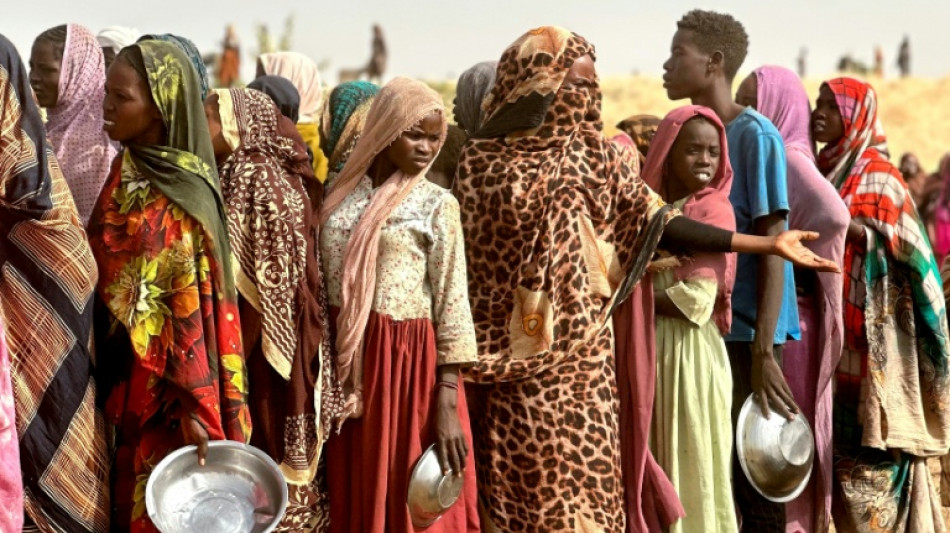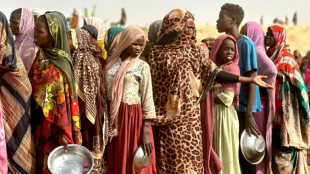

Paramilitaries declare rival government as Sudan war enters third year
Two years into a war that has left tens of thousands dead, Sudan's paramilitary force on announced its own government to rival the army-backed administration it is battling.
The United Nations has said that the conflict that erupted on April 15, 2023 is the world's worst humanitarian crisis, with 13 million people displaced -- including more than 3.5 million to other countries -- and no sign of peace on the horizon.
The Rapid Support Forces, headed by Mohamed Hamdan Daglo, the former deputy to the regular army leader Abdel Fattah al-Burhan, announced the rival government amid growing international fears that Sudan could become split between the two sides, who have both been accused of abuses.
"On this anniversary, we proudly declare the establishment of the Government of Peace and Unity, a broad coalition that reflects the true face of Sudan," Daglo said in a Telegram statement.
The RSF and its allies signed a charter in Kenya in February declaring a "government of peace and unity" in areas they control.
Daglo's latest statement said the paramilitaries, with "civil and political forces", had signed a transitional constitution, that was a "roadmap for a new Sudan".
That constitution provides for a 15-member presidential council "representing all regions, symbolising our voluntary unity".
Analysts have warned that Africa's third biggest nation could permanently splinter.
With the RSF emboldened in Darfur, "the territorial division that's occurring could mean a de facto separation," said Sharath Srinivasan, a professor at Cambridge University who studies Sudan.
- Mass displacement -
The eruption of the war in Khartoum in 2023 already left countless dead and sent hundreds of thousands fleeing.
Those left behind struggled to survive under the control of the RSF control, that has been accused of looting and sexual violence.
"I've lost half my bodyweight," said 52-year-old Abdel Rafi Hussein, who stayed in the capital under RSF control until the army retook it last month.
"We're safe (now), but still, we suffer from a lack of water and electricity and most hospitals aren't working."
Now the RSF is seeking to cement its grip on the western region of Darfur, where it has laid siege to El-Fasher -- the last major city in the region outside its control.
More than 400 people have been killed in recent days, the United Nations said, with the paramilitaries having claimed control of the nearby Zamzam displacement camp on Sunday.
An estimated 400,000 civilians fled the famine-hit camp as the RSF advanced, according to the International Organization for Migration.
The army said on Tuesday that it had carried out "successful air strikes" against RSF positions northeast of the city.
An international conference in London demanded a halt to fighting while the United States condemned the toll in Darfur.
State Department spokeswoman Tammy Bruce said the RSF was carrying out an "escalation of attacks" on El Fasher and nearby camps.
"We are deeply alarmed by reports the RSF has deliberately targeted civilians and humanitarian actors in Zamzam and Abu Shouk," Bruce said.
- 'End the suffering' -
In London, ministers from several countries discussed ways to end the conflict but neither of the warring parties were at the conference.
European nations led calls for "an immediate and permanent ceasefire" to end the devastating war. Nations also pledged more than 800 million euros ($900 million) in fresh humanitarian aid.
Countries, and organisations including the African Union, also "stressed the necessity of preventing any partition of Sudan."
Group of Seven foreign ministers, meeting in Canada, also called for an immediate and unconditional ceasefire.
In a statement these wealthy countries urged both sides in the war to "engage meaningfully in serious, constructive negotiations."
Precise death tolls are not available, but former US envoy Tom Perriello cited estimates last year of up to 150,000 dead.
On Tuesday, the UN said 2.1 million people are expected to return to Khartoum over the next six months following the army's recapture of the capital.
In central Sudan -- where the UN said nearly 400,000 people had returned to areas retaken by the army -- many have come back to find their homes in ruins.
Zainab Abdel Rahim, 38, returned to Khartoum North this month with her six children, to find their house looted beyond recognition.
"We're trying to pull together the essentials, but there's no water, no electricity, no medicine," she said.
Aid agencies say hunger is now a widespread menace.
The Zamzam camp in Darfur, which had been sheltering up to one million people, was the first place in Sudan where famine was declared.
Other nearby camps have followed and famine is expected to take hold in El-Fasher by next month.
On Monday, UN Secretary General Antonio Guterres called for an end to "the external support and flow of weapons" fuelling the war. He did not name any country.
The army-backed government has accused the United Arab Emirates of arming the paramilitaries through Chad, an accusation the Gulf state and the RSF deny.
burs-bha/jsa/tw/dw
T.Murray--NG



